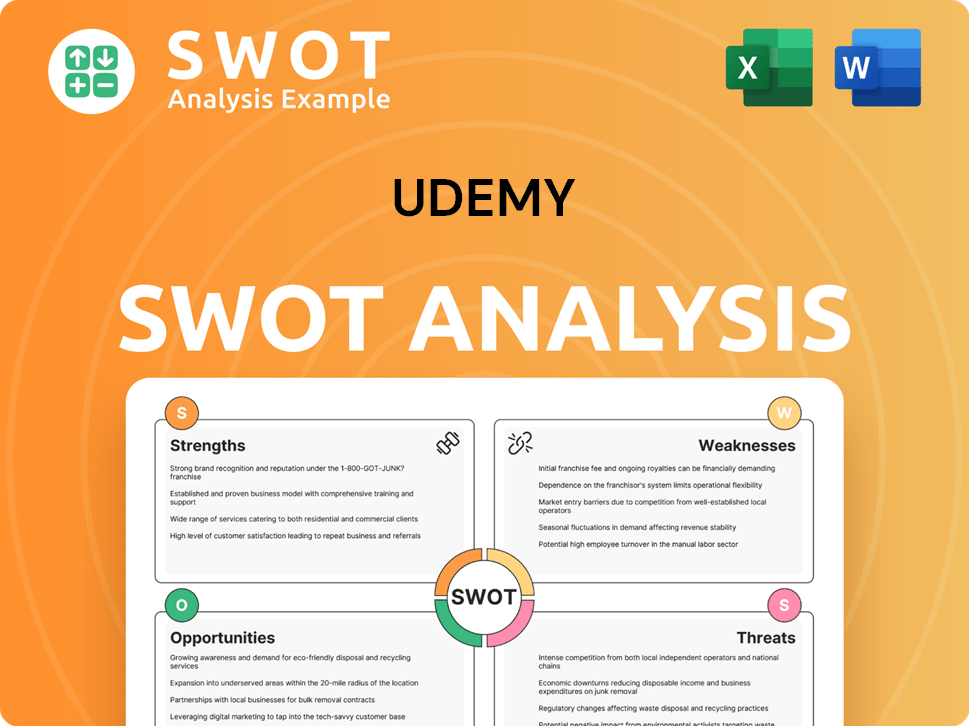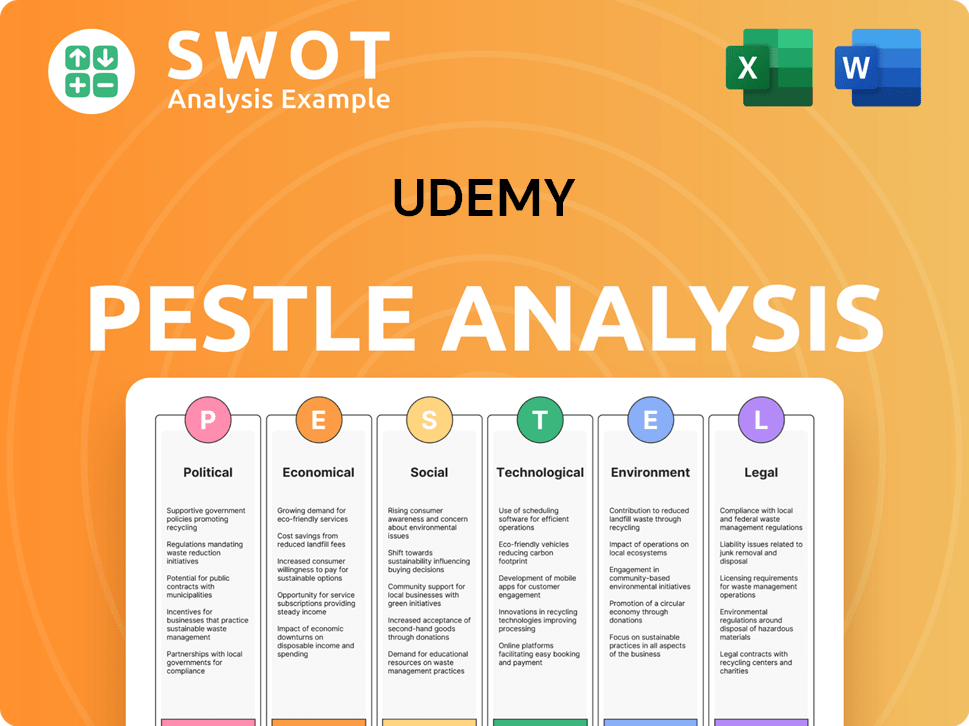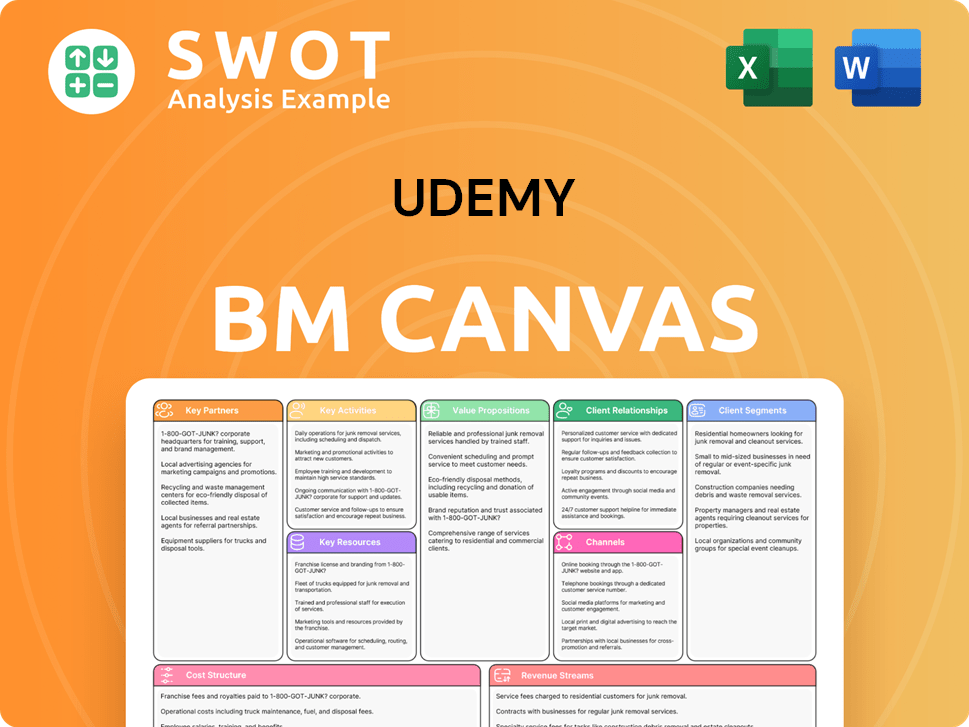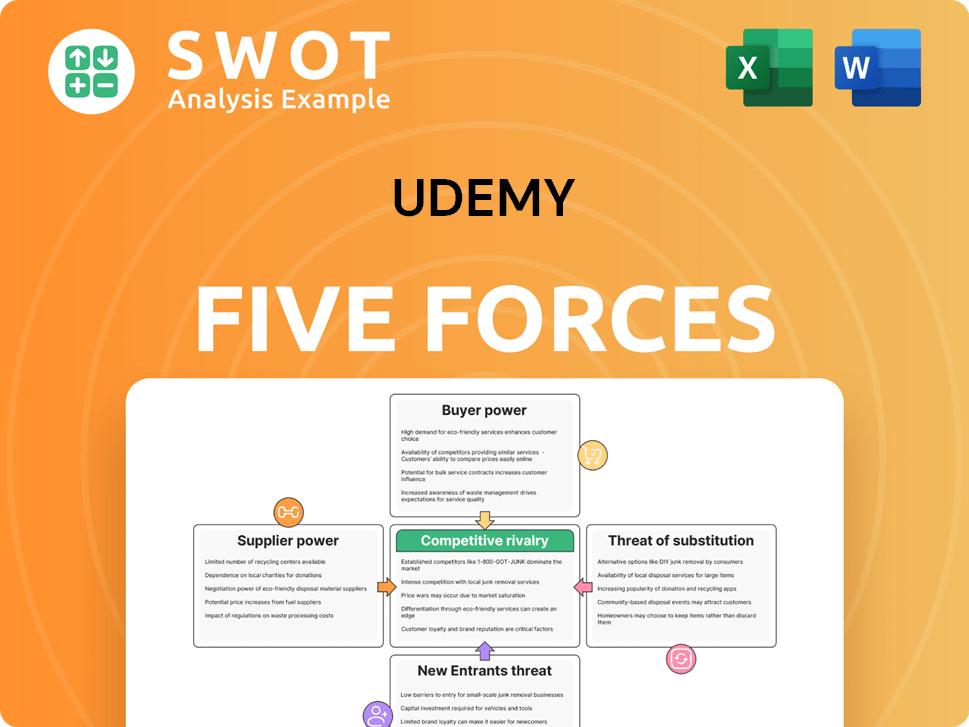Udemy Bundle
Who Really Owns Udemy?
Understanding the ownership structure of a company is crucial for grasping its strategic direction and potential for growth. Udemy, a leading online learning platform, has undergone a significant transformation since its inception. This journey from a startup with a vision to a publicly traded entity has reshaped its ownership landscape, impacting its operations and future prospects. Let's delve into the fascinating evolution of the Udemy SWOT Analysis.

The shift to a public company in October 2021 marked a pivotal moment for the Udemy company, altering the dynamics of who owns Udemy. Tracing the Udemy history reveals the influence of founders, early investors, and now, a diverse group of public shareholders. This analysis will explore the key players, from the Udemy parent company's initial backers to the current stakeholders, and examine how their interests shape the company's trajectory, including its valuation and financial performance, and where is Udemy located.
Who Founded Udemy?
The online learning platform, was founded in 2010. The founders aimed to create a platform that would democratize education, making a wide array of courses accessible to anyone, anywhere. This vision shaped the initial structure and direction of the company.
The founders of the company were Eren Bali, Gagan Biyani, and Oktay Caglar. Eren Bali took on the role of CEO, bringing expertise in software development. Gagan Biyani focused on business development and strategy, while Oktay Caglar contributed to the technical architecture of the platform. Their combined skills were crucial in the early stages.
The early ownership structure of the company involved the founders and early investors. While the exact initial equity splits are not publicly available, it is common for founders to hold significant stakes. Early investors, including angel investors, played a vital role by providing capital and expertise. These early backers helped transform the founders' vision into a functional platform.
Understanding the early ownership and the founders' roles provides insight into the company's origins and strategic direction. The founders' vision, combined with early investor support, laid the groundwork for the platform's growth. The early focus was on building a platform that would make education accessible to a global audience, as highlighted in the article about the Target Market of Udemy.
- Who founded Udemy: Eren Bali, Gagan Biyani, and Oktay Caglar.
- Udemy's current CEO: The current CEO is not explicitly mentioned in the provided context; however, the initial CEO was Eren Bali.
- Who is the owner of Udemy: The ownership structure has evolved since its founding, with various investors holding stakes.
- Is Udemy a public company: Yes, it is a public company.
- Udemy's investors: Early investors included angel investors who provided crucial capital and expertise.
Udemy SWOT Analysis
- Complete SWOT Breakdown
- Fully Customizable
- Editable in Excel & Word
- Professional Formatting
- Investor-Ready Format

How Has Udemy’s Ownership Changed Over Time?
The ownership structure of the online learning platform has seen significant changes since its inception. The most notable shift occurred with its Initial Public Offering (IPO) on October 29, 2021. The company began trading on the Nasdaq under the ticker UDMY, with an initial market capitalization of around $3.7 billion. This transition brought in a wide array of public shareholders. Before the IPO, the company went through several private funding rounds, which attracted substantial investments from venture capital firms. Key investors during this private phase included Insight Partners, Prosus, and Stripes.
Before going public, the company secured a Series F funding round in February 2020, led by Learn Capital and including Prosus, which valued the company at $2 billion. This demonstrates the growth and investor confidence the company had garnered before its public debut. Understanding the evolution of the company's ownership provides insights into its strategic direction and financial health, especially as it navigates the public market.
| Event | Date | Impact on Ownership |
|---|---|---|
| Series F Funding Round | February 2020 | Valuation at $2 billion; led by Learn Capital with Prosus participation. |
| IPO | October 29, 2021 | Public offering on NASDAQ; increased shareholder base; market capitalization of approximately $3.7 billion. |
| Ongoing | Early 2025 | Institutional investors hold significant portions of stock. |
As of early 2025, the primary stakeholders are institutional investors. Large asset management firms and mutual funds hold substantial portions of the company's stock. For example, as of March 31, 2025, institutional ownership in UDMY is significant, with filings indicating top holders such as Vanguard Group Inc., BlackRock Inc., and T. Rowe Price Associates Inc. These institutional holdings collectively represent a significant percentage of the outstanding shares, influencing corporate governance through their voting power. The shift to public ownership has increased transparency and the focus on shareholder value. For further insights into the company's strategic moves, consider exploring the Growth Strategy of Udemy.
The company's ownership has evolved from private funding to a public structure. This transition has brought in institutional investors as major stakeholders. The IPO in 2021 was a pivotal moment, expanding the shareholder base and increasing market capitalization.
- Institutional investors hold a significant portion of the company's stock.
- The IPO marked a shift to greater transparency and shareholder focus.
- The company's valuation and investor base have grown over time.
- Understanding the ownership structure is key to assessing its strategic direction.
Udemy PESTLE Analysis
- Covers All 6 PESTLE Categories
- No Research Needed – Save Hours of Work
- Built by Experts, Trusted by Consultants
- Instant Download, Ready to Use
- 100% Editable, Fully Customizable

Who Sits on Udemy’s Board?
As of early 2025, the board of directors for the online learning platform includes a mix of independent directors and representatives from major stakeholders. This structure is typical for a publicly traded company, ensuring oversight of strategic direction and accountability to shareholders. The board's composition often reflects the influence of significant investors, such as institutional investors or private equity firms that may retain stakes following an initial public offering (IPO).
Details regarding specific board members representing major shareholders are not always publicly available. However, the presence of such representation or influence in board appointments is common practice. The board's role is crucial in guiding the company's performance and ensuring alignment with shareholder interests. For more information on the competitive environment, consider reading about the Competitors Landscape of Udemy.
| Board Member | Title | Notes |
|---|---|---|
| Not publicly available | CEO | Oversees daily operations and strategic direction. |
| Not publicly available | Independent Director | Provides independent oversight and perspective. |
| Not publicly available | Independent Director | Focuses on governance and shareholder interests. |
The voting structure for the company's common stock generally follows a one-share-one-vote system. This means that each share of common stock grants its holder one vote on matters submitted to a stockholder vote. There are no publicly disclosed details of dual-class shares or special voting rights that would grant outsized control to specific individuals or entities beyond their equity ownership. This structure ensures that major institutional holders collectively wield significant influence over key corporate decisions and board elections.
The standard one-share-one-vote structure ensures that major institutional holders wield significant influence. The board of directors oversees the company's strategic direction and ensures accountability to shareholders. The board's composition reflects the influence of significant investors.
- One-share-one-vote system.
- Board members oversee the company's strategic direction.
- Major institutional holders wield significant influence.
- No dual-class shares or special voting rights.
Udemy Business Model Canvas
- Complete 9-Block Business Model Canvas
- Effortlessly Communicate Your Business Strategy
- Investor-Ready BMC Format
- 100% Editable and Customizable
- Clear and Structured Layout

What Recent Changes Have Shaped Udemy’s Ownership Landscape?
The ownership profile of the Udemy company has evolved significantly since its initial public offering (IPO) in October 2021. As a publicly traded entity, Udemy's stock performance has directly influenced investor sentiment and ownership trends. Although specific large-scale share buybacks or secondary offerings by Udemy in late 2024 or early 2025 haven't been widely publicized, publicly listed companies frequently adjust their strategies based on market dynamics and capital allocation priorities. The e-learning sector has experienced an increase in institutional ownership, reflecting the industry's maturation, with major asset managers consistently holding substantial positions in Udemy.
Founder dilution is a natural outcome of multiple funding rounds and an IPO, as new investors acquire stakes. However, founders often maintain leadership roles, even with reduced ownership percentages. Industry trends indicate continued interest from institutional investors in established ed-tech platforms like Udemy. There's also a general trend of consolidation within the online learning space, potentially leading to future ownership changes through mergers and acquisitions, although no specific plans for Udemy have been announced. Public statements from the company or analysts typically focus on growth strategies, financial performance, and market expansion rather than specific ownership changes. Any significant leadership changes or strategic shifts could indirectly impact ownership dynamics. Considering the current market, investors are closely monitoring the Udemy owner and their strategic decisions.
| Metric | Data | Source/Year |
|---|---|---|
| IPO Date | October 2021 | Public Filings |
| Stock Performance Influence | Investor Sentiment and Ownership Trends | Market Analysis |
| Institutional Ownership Trend | Increasing | Industry Reports |
The shift towards institutional ownership in the ed-tech sector, including Udemy, reflects a maturing market. The company's financial performance and strategic decisions play a crucial role in shaping its ownership structure. As of late 2024, the focus remains on growth and market expansion, with any significant changes in leadership or strategy potentially impacting ownership dynamics. For more insights into the company, you can read further analysis on various aspects, including the Udemy ownership structure.
The IPO in October 2021 significantly influenced Udemy's ownership structure. Market performance and investor sentiment have been key factors. Institutional investors have increased their holdings in the company.
While founder dilution is typical after an IPO, founders often remain in leadership. This ensures continuity and strategic direction. Reduced ownership doesn't always mean reduced influence.
The online learning space is seeing consolidation. This could lead to future ownership changes. Mergers and acquisitions are a possibility for Udemy.
Udemy's focus is on growth, financial performance, and market expansion. Leadership changes or strategic shifts can impact ownership. Investors closely watch these developments.
Udemy Porter's Five Forces Analysis
- Covers All 5 Competitive Forces in Detail
- Structured for Consultants, Students, and Founders
- 100% Editable in Microsoft Word & Excel
- Instant Digital Download – Use Immediately
- Compatible with Mac & PC – Fully Unlocked

Related Blogs
- What are Mission Vision & Core Values of Udemy Company?
- What is Competitive Landscape of Udemy Company?
- What is Growth Strategy and Future Prospects of Udemy Company?
- How Does Udemy Company Work?
- What is Sales and Marketing Strategy of Udemy Company?
- What is Brief History of Udemy Company?
- What is Customer Demographics and Target Market of Udemy Company?
Disclaimer
All information, articles, and product details provided on this website are for general informational and educational purposes only. We do not claim any ownership over, nor do we intend to infringe upon, any trademarks, copyrights, logos, brand names, or other intellectual property mentioned or depicted on this site. Such intellectual property remains the property of its respective owners, and any references here are made solely for identification or informational purposes, without implying any affiliation, endorsement, or partnership.
We make no representations or warranties, express or implied, regarding the accuracy, completeness, or suitability of any content or products presented. Nothing on this website should be construed as legal, tax, investment, financial, medical, or other professional advice. In addition, no part of this site—including articles or product references—constitutes a solicitation, recommendation, endorsement, advertisement, or offer to buy or sell any securities, franchises, or other financial instruments, particularly in jurisdictions where such activity would be unlawful.
All content is of a general nature and may not address the specific circumstances of any individual or entity. It is not a substitute for professional advice or services. Any actions you take based on the information provided here are strictly at your own risk. You accept full responsibility for any decisions or outcomes arising from your use of this website and agree to release us from any liability in connection with your use of, or reliance upon, the content or products found herein.